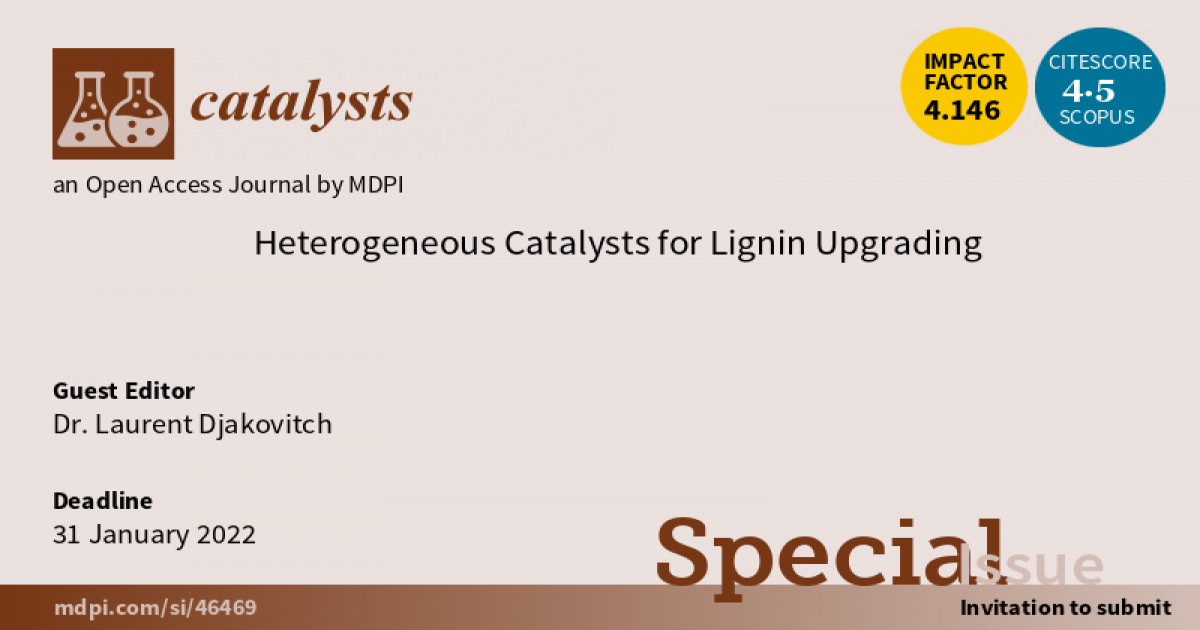Heterogeneous Catalysts for Lignin Upgrading
A special issue of Catalysts (ISSN 2073-4344). This special issue belongs to the section "Environmental Catalysis".
Deadline for manuscript submissions: closed (31 January 2022) | Viewed by 12777

Special Issue Editor
Interests: Environmental Science; Chemistry; Chemical Engineering; Materials Science; Biochemistry; Genetics and Molecular Biology
Special Issues, Collections and Topics in MDPI journals
Special Issue Information
Dear colleagues,
Lignin valorization became last years a highly attractive area due to its potential for producing chemicals, fuels and bio-based materials, particularly with high content of aromatics. Actually, lignin is the second most abundant bio-polymer that did not compete with food industries, after cellulose, representing ca. 25% of available biomass and the only one made of aromatics. Lignin are mainly produced by paper industries (i.e.: Kraft, Sulfite or Soda processes); however, few new biorefineries produce as well so called Organosolv lignin. If lignin valorization to energy is somewhat addressed in the paper industries through burning, lignin upgrading to chemical, with high added-value, stay in its infancy. Therefore, developing efficient processes to produce aromatics from lignin remains a major challenge justifying the intensive researches in this area. Theses researches aim also at enhancing the economical balance of biorefineries.
With this mind, the development of catalysts, mainly heterogeneous catalysts, represent a very attractive area. When associated to processes, these researches represent therefore key investigations for developing further biorefineries by defining breakthrough technologies for the chemical industries.
It is a pleasure to invite you to contribute to this special issue of Catalysts given your intensive contributions to this area. This special issue covers development of catalysts (heterogeneous and homogeneous systems), processes through design and use of reactor including engineering aspects, industrial applications from demonstration plants to production implementations.
Original research papers, as well as review articles are welcome. While focused on development and use of heterogeneous catalysts to upgrade lignin to chemical, researches devoted to discovery of efficient homogeneous systems are also strongly encouraged.
Dr. Laurent DjakovitchGuest Editor
Manuscript Submission Information
Manuscripts should be submitted online at www.mdpi.com by registering and logging in to this website. Once you are registered, click here to go to the submission form. Manuscripts can be submitted until the deadline. All submissions that pass pre-check are peer-reviewed. Accepted papers will be published continuously in the journal (as soon as accepted) and will be listed together on the special issue website. Research articles, review articles as well as short communications are invited. For planned papers, a title and short abstract (about 100 words) can be sent to the Editorial Office for announcement on this website.
Submitted manuscripts should not have been published previously, nor be under consideration for publication elsewhere (except conference proceedings papers). All manuscripts are thoroughly refereed through a single-blind peer-review process. A guide for authors and other relevant information for submission of manuscripts is available on the Instructions for Authors page. Catalysts is an international peer-reviewed open access monthly journal published by MDPI.
Please visit the Instructions for Authors page before submitting a manuscript. The Article Processing Charge (APC) for publication in this open access journal is 2700 CHF (Swiss Francs). Submitted papers should be well formatted and use good English. Authors may use MDPI's English editing service prior to publication or during author revisions.
Keywords
- Lignin
- Chemicals
- Biomass upgrading
- Catalysis
- Heterogeneous catalysts
- Chemical engineering
- Processes
- Biorefinery





